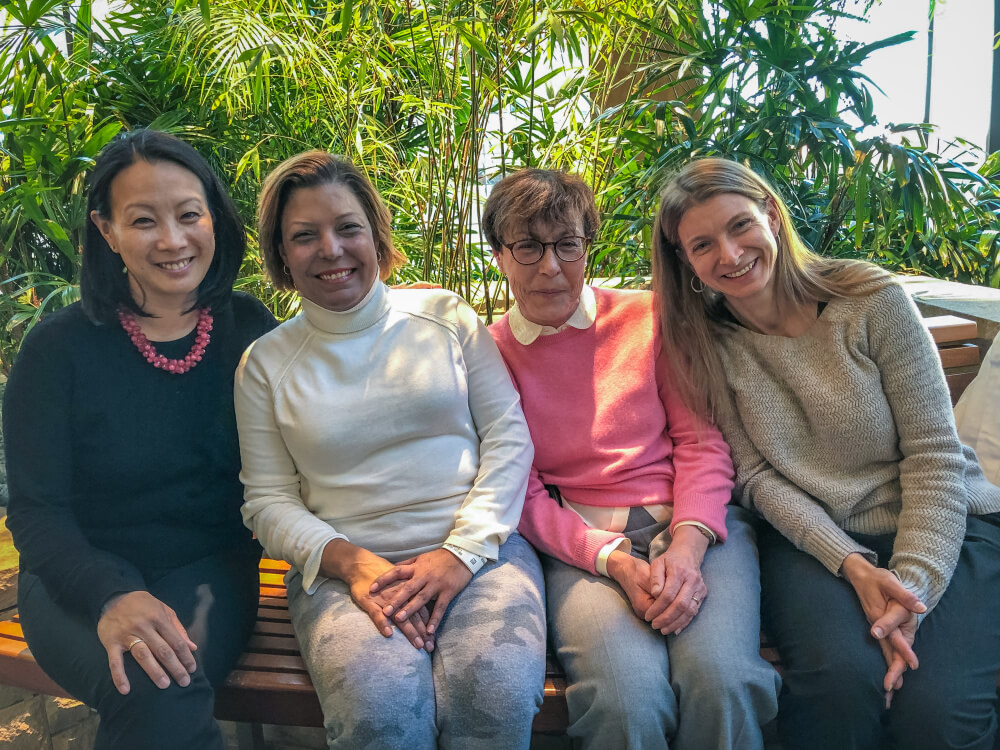Martha Pena has endured breast cancer twice (once in each breast), lung cancer that metastasized to her brain, and stomach (gastric) cancer — all by age 40. Now 42, she is receiving ongoing treatment for her lung and gastric cancer at Dana-Farber, where she was also diagnosed with Li-Fraumeni syndrome (LFS), a rare hereditary condition caused by a genetic mutation that greatly increases one’s risk for multiple cancers.
It is a daunting history, but Pena believes in staying positive no matter the situation. Daily oral medication for one cancer, and infusion visits every two weeks for another, don’t leave her much time to dwell on the past. Each new day is something to cherish, not fear, she says.
“I look at cancer as my chronic condition,” says Pena, who grew up in the Dominican Republic and has been a Massachusetts resident since 2008. “Conceptualizing it that way is what helps me live my life, that and my religious faith.”
Two more sources of strength are her children: daughter Camille, 17, and son Juan Jose, 10. Milestones like Camille’s high school graduation and transition to college later this year serve as measuring sticks in Pena’s cancer journey, one which has forced her to quit working to maintain her physical strength as a patient and mother.
By continuing to maintain her optimism as her care team seeks new treatments, Pena says, she may help other patients — and reach more of those measuring-stick moments.

Many times tested
Cancer interrupted two of the greatest times of Pena’s life. In 2001, while still in her native Santo Domingo, she was enjoying her first month as a new mother to Camille when her sister, an obstetrician, noticed a bump on Martha’s right breast.
Treatment included surgery, chemotherapy, a mastectomy, and reconstruction, a regimen largely repeated in 2010 when — one month after giving birth to Juan Jose — a second primary cancer was found in Pena’s left breast.
“It was worse the second time,” Pena recalls. “But we got through it.”
By then Pena was living in the United States and was a patient at Dana-Farber, where she formed a strong bond with caregivers including social worker Rachel Allende, LICSW. Allende is fluent in Pena’s first language, Spanish, and again provided support when Pena had a biopsy in 2012 after she started having coughing fits.
The diagnosis this time was lung cancer. In addition to treatment, doctors referred Pena to Dana-Farber’s Center for Cancer Genetics and Prevention.
A revealing genetic profile
Genetic testing revealed Pena was positive for the TP53 gene and Li-Fraumeni syndrome. She was matched with a cancer genetics specialist at Dana-Farber’s Li-Fraumeni Syndrome and TP53+ Center. The center develops personalized cancer risk management plans for children, adolescents, and adults with LFS and TP53+ results, and works with health care providers — oncologists, pediatricians, primary care physicians, and others — to provide ongoing care.
After Pena’s care team was alerted to her hereditary condition, they paid close attention to a red flag: Pena nearly blacked out while driving a friend to chemotherapy treatment at Dana-Farber in 2016. Knowing that her syndrome predisposed her to a wide range of cancers, they ordered tests to investigate. Scans revealed small spots on Pena’s brain, where her lung cancer had traveled.
“After each setback, you would prepare for Martha to be in terrible spirits,” explains nurse practitioner Nina Grenon, DNP, AGNP, another member of Pena’s tight-knit care team. “Then you’d walk in to the next appointment and she would be smiling like always. Her resiliency is incredible.”

And her sense of humor stayed intact.
“I felt like I was in a telenovela,” Pena says of that episode. “Lucky for me, I was already at Dana-Farber when it happened. This place always finds a way to help me.”
Coordinated care, hopeful research
Pena has been at Dana-Farber quite often since then; while her brain metastases were successfully eliminated, her lung cancer (and now gastric cancer) remain active. Her complicated history and multiple therapy regimens make it paramount that treatment be carefully coordinated, explains Kimmie Ng, MD, MPH, co-director of the Colon and Rectal Cancer Center at Dana-Farber.
“In putting together a plan for Martha’s stomach cancer treatment, we needed to take into consideration the lung cancer and its prognosis,” says Ng. “It is critical that the two teams partner together, and the multidisciplinary approach has worked well. Martha has dealt beautifully with both cancers, without much toxicity, remaining hopeful and optimistic. It’s inspiring to see.”
In addition, Ng says, the reasons — genetic and otherwise — for Pena’s ability to bounce back from several different cancers may yield answers that help future patients.
“There is a lot of focus now on studying exceptional responders and patients who do way better than the norm,” says Ng. “Martha has consented to help our research in any way she can, and I certainly think we will be able to learn a lot from her case.”
Pena expects to benefit from that knowledge herself.
“After 18 years with cancer, I’m still here,” she says. “I am glad to support and help other people — and hopefully that will include me.”
